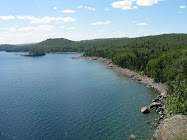Monday, April 3
Daylight Savings Time
What exactly is the point of daylight savings? Isn't it so we have more daylight at the end of the day? Makes sense, I suppose. But wouldn't we eventually gain that extra time as the summer goes on anyways because of the solstice or whatever it's called? Right now it's 7:25 p.m. and it's still light outside, which is nice. It would be even nicer if it was warmer and we could take advantage of the extra time! The thing that I don't like about daylight savings is that my internal clock gets messed up. I have a hard time understanding why this happens. I'm not the type of person that always goes to bed at a certain time or always wakes up at a certain time. My normal bed time is anywhere between 9:00 p.m. and midnight, and I generally wake up between 6:00 a.m. and 7:30 a.m., depending on what the day has in store for me. Unless of course it's Saturday morning, in which case I try to sleep in, but not usually. It would be easier for me to understand why I feel so sleep deprived if I did have a regular sleeping schedule, say from 10:00 p.m. until 6:00 a.m., but I don't. Maybe it has to do with the environment itself, with the "daylight", or lack thereof. And the same happens in the fall when daylight savings time ends and it suddenly is dark before I leave work at 5:00 p.m. One would think that your body would like that change, the extra hour of sleep that one Sunday morning. But nope, it doesn't. All I know is that it takes over a week to get regulated again. And who determines if daylight savings time is even the way to go? I saw on t.v. once that there in one county in Indiana somewhere that doesn't set the clocks back and forth, but the rest of the state does. I don't remember if for that part of the year that county is one hour ahead or one hour behind, ahead, I believe. Either way it seems like it'd cause confusion and chaos! I wonder what the majority of people think...do they like daylight savings or do they dislike it? I'm undecided.
Subscribe to:
Post Comments (Atom)


3 comments:
Daylight Saving Time Saves Energy
One of the biggest reasons we change our clocks to Daylight Saving Time (DST) is that it saves energy. Energy use and the demand for electricity for lighting our homes is directly connected to when we go to bed and when we get up. Bedtime for most of us is late evening through the year. When we go to bed, we turn off the lights and TV.
In the average home, 25 percent of all the electricity we use is for lighting and small appliances, such as TVs, VCRs and stereos. A good percentage of energy consumed by lighting and appliances occurs in the evening when families are home. By moving the clock ahead one hour, we can cut the amount of electricity we consume each day.
Studies done in the 1970s by the U.S. Department of Transportation show that we trim the entire country's electricity usage by about one percent EACH DAY with Daylight Saving Time.
Daylight Saving Time "makes" the sun "set" one hour later and therefore reduces the period between sunset and bedtime by one hour. This means that less electricity would be used for lighting and appliances late in the day.
We also use less electricity because we are home fewer hours during the "longer" days of spring and summer. Most people plan outdoor activities in the extra daylight hours. When we are not at home, we don't turn on the appliances and lights. A poll done by the U.S. Department of Transportation indicated that Americans liked Daylight Saving Time because "there is more light in the evenings / can do more in the evenings."
While the amounts of energy saved per household are small...added up they can be very large.
In the winter, the afternoon Daylight Saving Time advantage is offset by the morning's need for more lighting. In spring and fall, the advantage is less than one hour. So, Daylight Saving Time saves energy for lighting in all seasons of the year except for the four darkest months of the year (November, December, January and February) when the afternoon advantage is offset by the need for lighting because of late sunrise.
A study was released in May 2001 by the State of California's Energy Commission to see if creating an early DST or going to a year-round DST will help with the electricity problems the state faced in 2000-2001-2002. To download a copy of the study, Effects of Daylight Saving Time on California Electricity Use, please look for: Publication # 400-01-13
In May 2001, the California state legislature sent a Senate Joint Resolution (SJRX2 1) to the White House and Congress asking that states be allowed to extend Daylight Saving Time year round. The resolution can be viewed at: http://www.leginfo.ca.gov/cgi-bin/p...author=karnette. Congress and the White House did not act on the request because of the world-changing events of September 11, 2001. No new legislation has been passed in California since then.
If you are still not satisfied.....
http://www.energy.ca.gov/daylightsaving.html
~I know it really messed up Miss Alyse's internal clock.. UGGGHHH!
Wow. You're smart! LOL... Thanks for the info. And here I thought that we just did it to be selfish so we had more playtime during the summer. Not sure I've ever heard the real reason for it! :)
Smokes! You asked, Vick! Not only was I messed up when daylight savings time happened this spring, but then I went to WI for a week, where the time is one hour behind. Now I'm back in MI, and my poor, confused body doesn't know what it's supposed to do! GRR!
Post a Comment